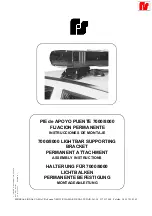
AUTOMATIC TRANSAXLE
Evaluation of line pressure test
Line pressure
Possible cause
Low pressure in all position/range
Worn oil pump
Oil leaking from oil pump, control valve body, and/or transaxle case
Pressure regulator valve is stuck.
Pressure control solenoid malfunction
Solenoid reducing valve is stuck.
Low pressure in D, S, L only
Oil leaking from hydraulic circuit of forward clutch
Low pressure in D (HOLD), S (HOLD)
only
Oil leaking from hydraulic circuit of 2—4 brake band
Low pressure in L (HOLD), R only
Oil leaking from hydraulic circuit of low and reverse brake
Low pressure in R only
Oil leaking from hydraulic circuit of reverse clutch
Higher pressure in all position/range
Pressure control solenoid malfunction
Pressure regulator valve is stuck.
Stall Test
1. Perform mechanical system test preparation. (See K2-21 MECHANICAL SYSTEM TEST, Mechanical System
Test Preparation.)
2. Start the engine.
3. Firmly depress the brake pedal with the left foot.
4. Shift the selector lever to D range.
Caution
• If the accelerator pedal is pressed for longer than 5 seconds while the brake pedal is pressed, the
transaxle could be dam aged. Therefore, perform Steps 5 and 6 within 5 seconds of each other.
5. Gently depress the accelerator pedal with the right foot.
6. When the engine speed no longer increases, quickly read the speed and release the accelerator pedal.
7. Shift the selector lever to N and let the engine idle for 1
minute or more
to cool the ATF.
8. Perform a stall test of D (HOLD), S, S (HOLD), L, L (HOLD) and R range positions in the same manner as in
Steps 3—7.
9. Turn the ignition switch off.
Engine stall speed
D, D (HO LD), S, S (HOLD), L, L (HOLD) range, R position: 2,200— 2,500 rpm
Evaluation of stall test
Condition
Possible cause
Worn oil pump
Insufficient line pressure, torque
converter pressure
Oil leaking from oil pump, control valve, and/or
transaxle case
Pressure regulator valve is stuck
Converter relief valve is stuck
Pressure control solenoid malfunction
Above specification
In forward ranges
Forward clutch slipping
In D (HOLD) and S (HOLD) ranges
2
— 4 brake band slipping
In L (HOLD) range and R position
Low and reverse brake slipping
In R position
Perform road test to determine whether problem is in
low and reverse brake or reverse clutch
• Engine braking felt in L range (HOLD).
Reverse clutch slipping.
• Engine braking not felt in L range (HOLD).
Low and reverse brake slipping.
Below specification
Engine out of tune
K 2-22
Summary of Contents for 626 Station Wagon
Page 25: ...CONTROL SYSTEM WIRING DIAGRAM With Immobilizer System OUTLINE F1 4 ...
Page 183: ...CONTROL SYSTEM COMPONENT LOCATION F2 7 ...
Page 204: ...MANUAL TRANSAXLE FEATURES OUTLINE J 2 OUTLINE OF CONSTRUCTION J 2 SPECIFICATIONS J 2 D J 1 ...
Page 266: ...SHIFT MECHANISM 6 Apply grease to the cam as shown K2 59 ...
Page 418: ...TROUBLESHOOTING KEYLESS ENTRY SYSTEM ON BOARD DIAGNOSTIC FUNCTION S 37 ...
Page 454: ...WARNING AND INDICATOR SYSTEM O p e ra tin g O rd e r T 32 ...
















































